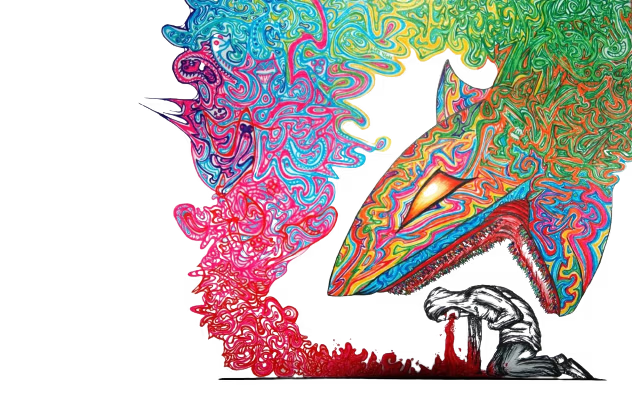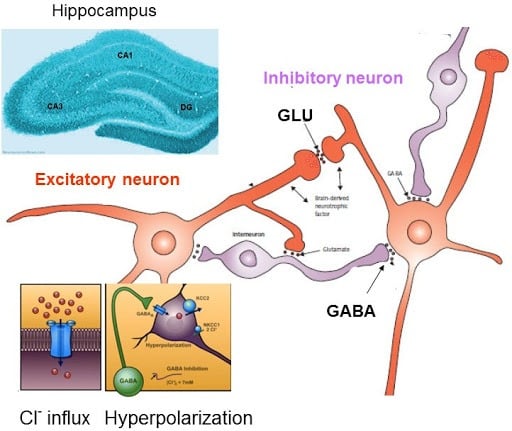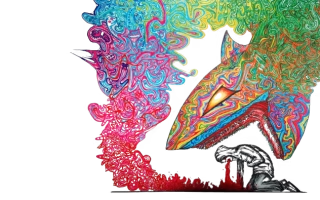Bad trips and psychedelics
Bad trips are unfortunately a downside of psychedelic experiences. In this article, we describe exactly what a bad trip entails, how to prevent these negative experiences, and what support is available (both during and after such an experience). This blog combines insights from recent research, practical tips, and scientific background to offer tips on how to avoid a negative psychedelic journey.
What is a bad trip?
A bad trip is an intense, often unpleasant experience that can occur during the use of psychedelic substances or other psychoactive drugs. It is characterized by feelings of anxiety, panic, paranoia, and confusion. The experience may be accompanied by physical symptoms such as nausea, dizziness, and palpitations. Scientifically speaking, bad trips are caused by a complex interplay of neurotransmitters in the brain, involving, for example, excessive stimulation of the glutamate, serotonin, and dopamine systems, while there is a deficiency of the calming hormone GABA.
Negative psychedelic experiences are often exacerbated by an unsafe or stressful environment and an unprepared mindset. Bad trips are most common among people who trip alone.

Causes and risk factors
These things often play a major role in experiencing a bad trip:
- Environmental factors: An unsafe or unfamiliar environment can increase feelings of anxiety.
- Emotional state: A vulnerable or stressed state of mind makes a person more susceptible to negative influences.
- Neurochemistry: Deviations in the amount of neurotransmitters in the brain significantly affect the trip.
- Interaction with other substances: The concomitant use of other agents or medications may increase the chance of a negative experience.
How can you prevent a bad trip?
Preventing a bad trip starts with preparation. At Triptherapie, we help with preparation for every psychedelic session we conduct. Neurochemistry may play the most important role, but the following factors also play a role:
- Set and setting: Provide a familiar environment or location specifically designed for psychedelic sessions. Choose a therapist who suits you to guide you. This so-called "“set & setting” is crucial to minimize negative emotions and unexpected fear reactions.
- Inform yourself thoroughly: If understanding how psychedelics work brings you peace of mind, read various scientific studies and personal stories about the effects and risks of the substances. A well-informed user can better anticipate difficult situations and then let them go.
- Dosage and purity: Always use a controlled dose and ensure the purity of the substances. Excessively high doses or impure substances can trigger a negative trip. For beginners, it's wise to gradually increase the dosage per session.
- Mental preparation and intention: Set your intentions beforehand and be open to what you're about to experience. Meditation and relaxation exercises can help prepare your mind.
GABA and glutamate: the biochemistry behind bad trips
Research shows that the balance between neurotransmitters plays a key role in the experience of a bad trip. Two neurotransmitters play a significant role in this. Glutamate is the main excitatory neurotransmitter in the brain, and excessive activation of its receptors can lead to nervous system overload and feelings of anxiety and panic.
GABA is the primary inhibitory neurotransmitter that regulates brain activity and moderates excessive stimulation. Understanding the effects of these two neurotransmitters on each other and during psychedelic sessions can help us better understand the causes of a bad trip and manage its effects. A proper balance between GABA and glutamate significantly reduces the risk of a negative psychedelic experience! Therefore, it's wise to pay attention to abnormalities in neurochemistry during preparation. At Triptherapie, we ensure that we balance neurochemistry before the session to increase the likelihood of a positive experience.

What can you do after a bad trip?
If a bad trip does occur, it's important to know how to deal with it in a healthy way. At least the day after the trip, give yourself plenty of rest and go to bed early to recover. A good night's sleep on the second day after the trip might work wonders. If you feel like you're not improving or you remain anxious, use these tips:
- Take GABA: GABA is a supplement that can help you relax more. If you're taking medication, you should inquire about whether GABA is suitable for you.
- Seek professional help: After a traumatic experience, it can be helpful to talk to a therapist or counselor. At Triptherapie, we offer professional guidance, where we explore the meaning of the experience together and find ways to integrate it.
- Debriefing and integration: A structured debriefing can help process the experience. This can be done through discussion groups or individual sessions, where emotions and insights are shared.
- Physical and mental self-care: Give yourself even more time and space to recover. Get enough sleep, eat a healthy diet, and engage in relaxing activities. This promotes recovery for both body and mind.
- Remember: Bad trips don't break the brain, but they can temporarily alter its functioning. Once the anxiety and stress subside, everything returns to normal.
Additional integration at Triptherapie
We offer additional integration sessions for our own clients, as well as for those who have experienced a journey themselves and feel they need to do something with the experience. Had a negative experience and want support from one of our therapists? Then take advantage of these additional integration sessions. You can view our current offerings via the button below.
Bad trips are only incidental
Thanks to our careful preparation, professional guides, and local precautions, bad trips are almost never a problem. Of the 2,500 people we've helped, bad trips are still a rare occurrence, and these people often didn't follow our instructions during the preparation process. All in all, based on our data, we estimate the risk of a bad trip at only 0.1 percent. That's about 1 in 1,000 if our protocol is followed.
Professional guidance at Triptherapie
At Triptherapie, we offer specialized support for people who have experienced negative experiences during a trip. Our guidance is based on the latest scientific insights and the practical experience of therapeutic professionals. We can help you with:
- Integration of the experience: Through structured integration sessions, we explore the meaning of your experience together.
- Safe and personal support: Each session is tailored to your personal needs, with the aim of creating a safe space for recovery.
- Preventive advice: We inform and advise on the risks and preventive measures, so that future negative experiences can be avoided as much as possible.
Contact or register
Interested in registering for a psychedelic session at Triptherapie? Complete the free intake form now. Have any questions? Check out our FAQ section or contact us.
Frequently asked questions about bad trips
Here are some of the questions people have about bad trips.
Stay calm, find a quiet place, and, if possible, ask someone you trust for help. Breathing exercises can help reduce tension.
Duration varies by person and substance, but the acute phase can last several hours. For example, the peak with psilocybin lasts only 2 hours, and with LSD, 4 hours. The afterglow and processing of the experience can take longer.
While a bad trip can be a traumatic experience, it doesn't necessarily lead to lasting damage. With the right support and integration, the experience can even lead to personal growth.
A bad trip is an intense, often negative experience that can occur while using psychedelic drugs, involving feelings of anxiety, panic, confusion, and physical symptoms such as nausea and dizziness.
General FAQ
Looking for a different question and answer? You can also use the search function on our site, consult the frequently asked questions section, or ask our chatbot, Trippy.
The recent questions from the Q&A
Psychedelic session for clients from abroad
How do I book psychedelic therapy in the Netherlands if I'm traveling from abroad? What are the options?
NPS law and MDMA analogues
Which MDMA analogues will become illegal as of July 1, 2025, due to the amended Opium Act?
Psychedelic therapists
Which of the therapists at Triptherapie are trained as psychologists and the like?
Truffle ceremony with psilocybin
How many truffles or mg of psilocybin do you get approximately during the magical truffle ceremonies?
Which psychedelic therapy?
Which psychedelics do you use in psychedelic therapy and ceremonies?
Psychedelic retreats
I'm coming from abroad and want to attend a psychedelic retreat. What should I keep in mind when planning my trip?
How much does a trip sitter cost and where do they work?
How much does a tripsitter cost in Amsterdam?
Can truffle therapy be done with a psychologist?
I'd like to try magic truffles with a psychologist. Do you offer this, or can I bring my own psychologist to the truffle session?
Little to no effect from truffles and MDMA
Why do I feel little effect from psychedelics like truffles and MDMA?
